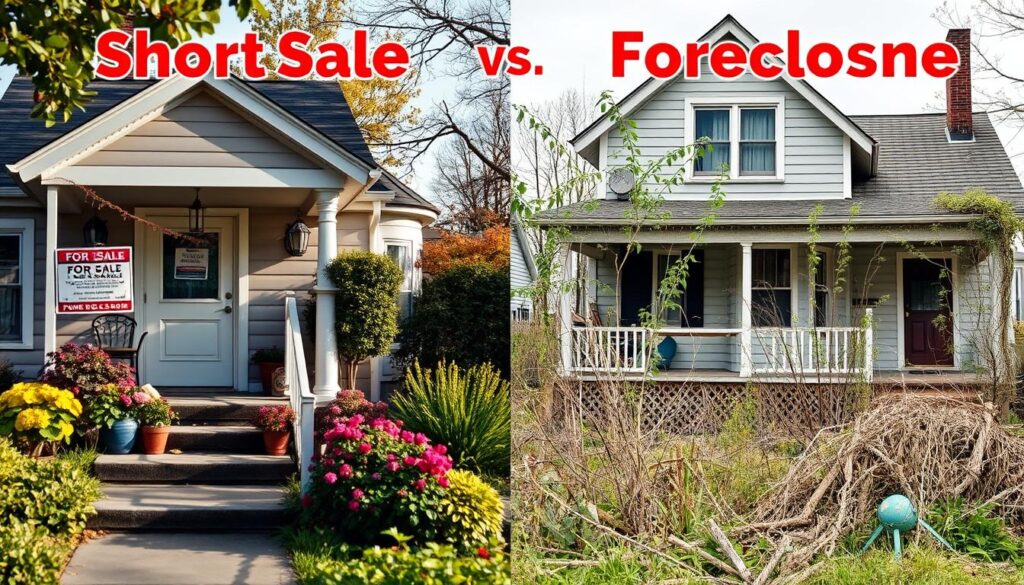Ever wondered how a homeowner in financial trouble can turn things around? In real estate finance, short sales can be a big help. A short sale happens when a seller sells their home for less than what they owe on the mortgage. This is usually done to avoid foreclosure and needs the lender’s okay.
It’s a win-win for both sellers and buyers in tough situations. Short sales are key in today’s housing market. They help homeowners in trouble and offer chances for buyers looking to invest.
It’s important to know what a short sale is and how it differs from foreclosure. This knowledge is crucial for understanding mortgage financing and credit scores. To learn more, check out short sales and their process.
Key Takeaways
- A short sale is when a homeowner sells their property for less than owed on the mortgage.
- Financial hardship is a critical factor in securing lender approval for a short sale.
- Short sales typically offer lower purchase prices, benefiting buyers.
- Foreclosures generally have a more detrimental impact on credit scores than short sales.
- Sellers may receive forgiveness of the remaining loan balance after the sale.
What Does Short Sale Mean?
A short sale happens when a homeowner sells their property for less than the mortgage amount. The lender must agree to this. It’s a way out for those in financial trouble, avoiding the harshness of foreclosure.
Definition of Short Sale
When a sale price is less than the mortgage, it’s called a short sale. Homeowners often face this when their property value drops below the mortgage. This can bring relief by forgiving most of the mortgage debt.
Common Reasons for Short Sales
Homeowners might choose a short sale for many reasons. These include:
- Severe financial distress from job loss, medical bills, or divorce.
- Property values dropping, leaving homeowners with an underwater mortgage.
- Wishing to avoid the long, credit-damaging process of foreclosure.
- Lender offers to help homeowners find more affordable housing.
However, short sales have their downsides. Homeowners have little say in the sale price and get no money from the sale.
The Short Sale Process
Understanding the short sale process is key for homeowners in tough financial spots. A short sale happens when a home is sold for less than the mortgage debt, with the lender’s okay. To start, you need to talk to your lender and gather important documents.
How to Initiate a Short Sale
To start a short sale, you must reach out to your lender. They’ll check if a short sale is possible. You’ll need to show you’re really struggling financially, like being jobless or having huge medical bills. If you qualify, the lender will tell you what you need to do, including signing a short sale agreement.
Gathering Necessary Documentation
After talking to your lender, you’ll need to gather documents. These include:
- A hardship letter explaining your financial troubles.
- Proof of income, like recent pay stubs or tax returns.
- Information about your assets and debts to show your full financial situation.
Having all this info is vital for the lender to make a decision. It can also speed up the short sale process.
Negotiating with the Lender
After the lender looks at your documents, you can start negotiating the sale price. This is about finding out how much the lender will accept to cover the mortgage. Good negotiators help sellers get a good deal while meeting the lender’s and buyer’s needs.
Knowing each step helps homeowners handle a short sale better. Getting help from real estate agents who know short sales can make the process easier.
Short Sale Advantages and Disadvantages
Short sales offer unique benefits for both sellers and buyers. They come with challenges, but knowing the pros and cons helps make better choices.
Advantages for Sellers
Sellers benefit from short sales by avoiding foreclosure. Foreclosure can badly hurt your credit, making it hard to get loans later. Short sales, on the other hand, cause less damage to your credit.
They help sellers avoid huge mortgage payments. This can be a big relief for homeowners.
Advantages for Buyers
Buyers might find short sales appealing because they can buy properties for less than market value. This can lead to quick equity gains if the property’s value goes up later. Plus, there’s less competition since short sales are complex.
This makes it easier to find good deals in real estate.
Disadvantages for Both Parties
Despite the benefits, short sales come with many challenges. The approval process can take a long time, from a month to over a year. Sellers might still owe money on the property after it’s sold, depending on the state.
Buyers face issues like buying properties ‘as is’ without repairs. If there are multiple liens on the property, getting all lenders to agree can be hard. It’s key to check if the seller has lender approval for a smooth process.
| Category | Short Sale Advantages | Short Sale Disadvantages |
|---|---|---|
| Sellers |
|
|
| Buyers |
|
|

It’s important to understand these points if you’re in the real estate market. Whether you’re a seller looking to avoid foreclosure or a buyer seeking a good deal, doing your homework can help a lot. Check out this guide for more insights.
Short Sale vs Foreclosure
It’s important to know the difference between short sales and foreclosures if you’re struggling with your mortgage. Both options help with mortgage problems but have different effects on your credit score.
Key Differences Explained
A short sale lets you sell your home for less than what you owe, with the lender’s okay. It usually takes 3 to 6 months and is often easier. Foreclosure happens when you miss payments and the lender takes your home, starting 3 to 6 months after the first missed payment.
Short sale homes are often in better shape than foreclosed ones, which are sold quickly but need repairs. Short sales can take longer because of slow bank responses.
Impact on Credit Scores
Both short sales and foreclosures affect your finances for a long time. Foreclosure hurts your credit score more, staying on reports for up to seven years. Short sales also hurt your score but less so. People who do short sales might be able to buy another home sooner than those who go through foreclosure.
| Criteria | Short Sale | Foreclosure |
|---|---|---|
| Process Duration | 3 – 6 months (or longer) | Usually faster |
| Property Condition | Often better than foreclosures | Typically sold as-is, may require repairs |
| Credit Score Impact | Less damaging | Significant damage, remains for 7 years |
| Future Home Purchase Eligibility | May not need to wait long | Minimum 5-year wait |
| Real Estate Market Result | Can offer greater return on investment | Sold typically below market value |

Conclusion
Understanding short sales is key for those in the real estate market. It’s especially important for homeowners in trouble and buyers looking for deals. A short sale happens when a home sells for less than what’s owed on it. This leaves the seller without enough money to pay off debts.
Homeowners might choose short sales to avoid foreclosure. It can help them financially and reduce their losses.
Short sales offer good investment chances, especially when property values drop. But, they’re complex and need careful planning. Sellers must document everything well and work closely with lenders. They also need to know the financial impacts.
It’s crucial for sellers to get help from legal, credit, and tax experts. They can guide through the serious issues that might come up.
Buyers should be ready for a long process when looking at short sales. But, the lower prices and less competition can make it worth it. For a quick sale, contacting professionals like Pierre Home Buyers at 617-960-8536 can help. They make the process smooth, even for tough properties.
More information on short sales can be found in this article.






